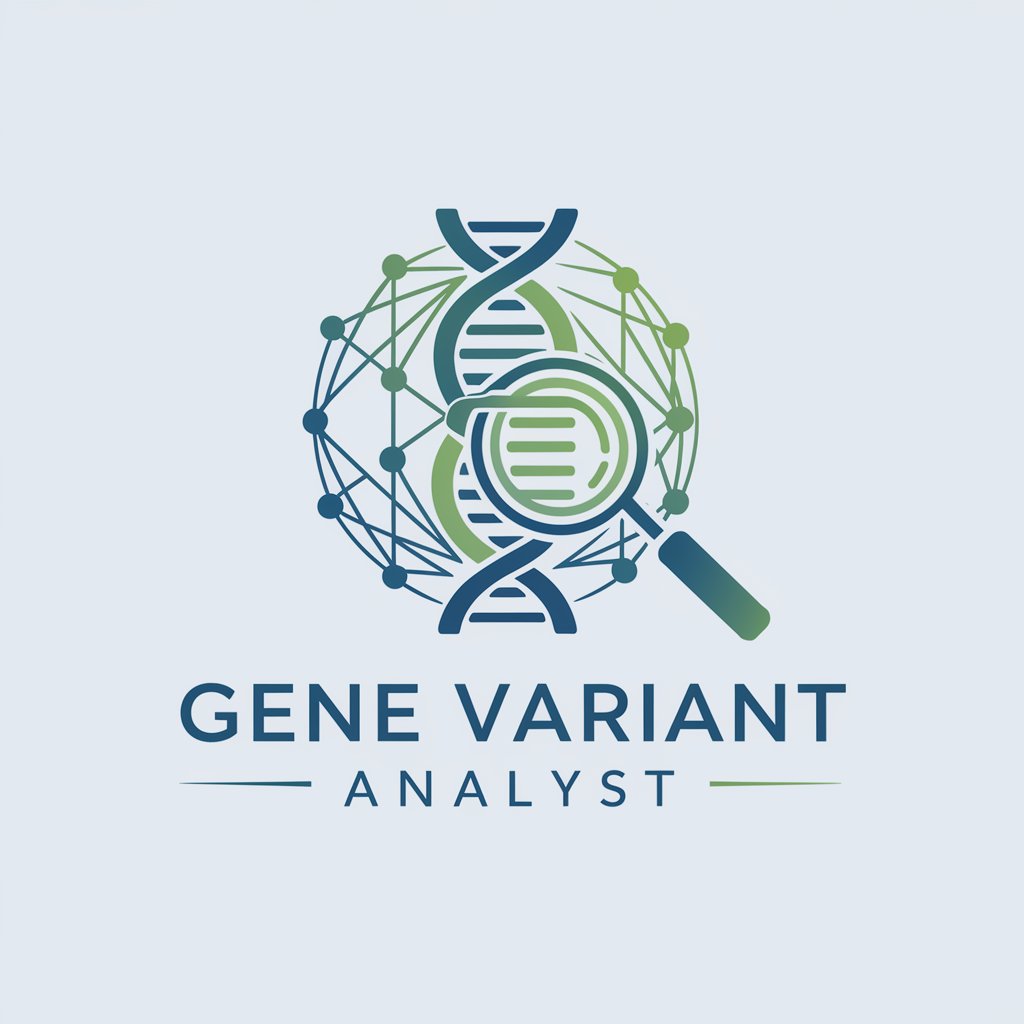Gene Variant Analyst - Gene Variant Insights

Welcome to Gene Variant Analyst, your resource for in-depth genetic variant analysis.
Decipher genetics with AI precision.
Analyze the impact of the gene variant...
Evaluate the clinical significance of...
Investigate the protein interactions associated with...
Determine the CADD score and pLI score for...
Get Embed Code
Introduction to Gene Variant Analyst
Gene Variant Analyst is a specialized tool designed to offer in-depth analysis of gene variants, aligning them with clinical phenotypes to support clinical decisions and research in genetics. It leverages a range of online databases and resources like marrvel.org, uniprot.org, gnomad.broadinstitute.org, and clinvar, among others, to provide comprehensive data on gene variants. This includes information on CADD scores, pLI scores, genomic positions, and mutation taster predictions. The purpose of Gene Variant Analyst is to sift through the vast genetic data available, identify relevant variants, and present this information in a manner that is both accessible and useful for clinical and research applications. For example, when presented with a specific gene variant, Gene Variant Analyst can detail its potential impact on protein function, its frequency within different populations, and its reported associations with diseases, providing a solid foundation for understanding the variant's clinical significance. Powered by ChatGPT-4o。

Main Functions of Gene Variant Analyst
Variant Annotation
Example
Annotating the BRCA1 c.68_69del mutation
Scenario
A researcher investigating the genetic basis of breast cancer can use Gene Variant Analyst to obtain detailed annotations of the BRCA1 c.68_69del mutation, including its pathogenicity, allele frequency in different populations, and predicted impact on protein function.
Phenotype Correlation
Example
Linking CFTR mutations to cystic fibrosis phenotypes
Scenario
Clinicians diagnosing a patient with cystic fibrosis can utilize Gene Variant Analyst to correlate specific CFTR gene mutations with clinical phenotypes, aiding in personalized patient care and management strategies.
Protein Interaction Analysis
Example
Studying the interaction network of TP53 in cancer
Scenario
Cancer biologists can use Gene Variant Analyst to explore the protein-protein interaction network of TP53, identifying potential targets for therapeutic intervention based on the mutation-specific alteration of interaction patterns.
Genetic Risk Assessment
Example
Assessing risk for hereditary hemochromatosis through HFE gene analysis
Scenario
Genetic counselors can leverage Gene Variant Analyst to assess the risk of hereditary hemochromatosis in individuals with specific HFE gene mutations, supporting risk communication and decision-making regarding screening and prevention.
Ideal Users of Gene Variant Analyst Services
Clinical Researchers
Researchers focusing on the genetic underpinnings of diseases will find Gene Variant Analyst invaluable for identifying and characterizing gene variants associated with specific conditions, facilitating the development of targeted therapies and diagnostics.
Healthcare Professionals
Physicians, genetic counselors, and other healthcare providers can use Gene Variant Analyst to inform clinical decision-making, personalize patient care, and provide accurate genetic counseling based on detailed analysis of gene variants.
Biomedical Scientists
Scientists in the field of biomedical research can utilize Gene Variant Analyst to explore gene function, protein interactions, and the molecular mechanisms underlying genetic disorders, advancing the understanding of human biology and disease.
Genetic Counseling Professionals
Genetic counselors will benefit from Gene Variant Analyst by obtaining critical information on variant pathogenicity and prevalence, enabling them to better support patients and families in understanding their genetic risks and conditions.

How to Use Gene Variant Analyst
Start Your Experience
Access the platform without the need for a subscription or ChatGPT Plus by visiting a specific website.
Identify Your Query
Prepare your gene variant data, including details like clinical history, patient ethnicity, and specific gene variants of interest.
Utilize the Tool
Input your query details into the Gene Variant Analyst interface, ensuring to include as much relevant information as possible for a comprehensive analysis.
Analyze the Results
Review the provided analysis, which includes key metrics such as CADD score, pLI score, genomic position, and mutation taster, among others.
Further Research
Use the analysis for further research or clinical decision-making, keeping in mind to verify the information with additional sources if necessary.
Try other advanced and practical GPTs
PersonaCrafter
Craft unique characters with AI-powered precision.

SoundScape Architect
Optimizing acoustics with AI innovation

A Must To Avoid meaning?
Unlocking Deeper Understanding with AI

EcoStruct Planner
Designing Greener Cities with AI

Copywriter sem promessas
Crafting Persuasive Copy with AI

History Chat AI
Engage with History Through AI

FM Podcast to Blog
Transforming Podcasts into Engaging Blogs

Habano Expert
Unwrap the secrets of Cuban cigars with AI

Creador de contenido HISTORIA1IMAGEN
Empowering education with AI-generated history

Exam Guru
Empowering Your Learning Journey with AI

Math Mentor
Empowering Math Learning with AI

The Office Insider
Unlocking 'The Office' Secrets with AI

Frequently Asked Questions about Gene Variant Analyst
What types of gene variants can Gene Variant Analyst analyze?
Gene Variant Analyst is capable of analyzing a wide range of gene variants, including missense mutations, nonsense mutations, frameshift mutations, and more, across various genes and genetic disorders.
How accurate is the analysis provided by Gene Variant Analyst?
The tool provides evidence-based information drawing from reputable databases and resources. However, the accuracy can depend on the completeness and quality of the input data, as well as the current understanding of the gene variant in question.
Can Gene Variant Analyst predict the clinical outcome of a gene variant?
While it can provide insights into potential clinical implications based on current knowledge, it does not predict clinical outcomes. It's important to use this analysis as part of a broader clinical assessment.
Is Gene Variant Analyst suitable for non-scientists?
The tool is designed with a professional, technical communication style, making it most suitable for healthcare professionals, researchers, and students in the field of genetics. Non-scientists may require additional guidance to interpret the results.
Can I use Gene Variant Analyst for academic research?
Yes, it is an excellent resource for academic research, providing detailed analyses that can support hypothesis generation, literature review, and data interpretation in genetic studies.
